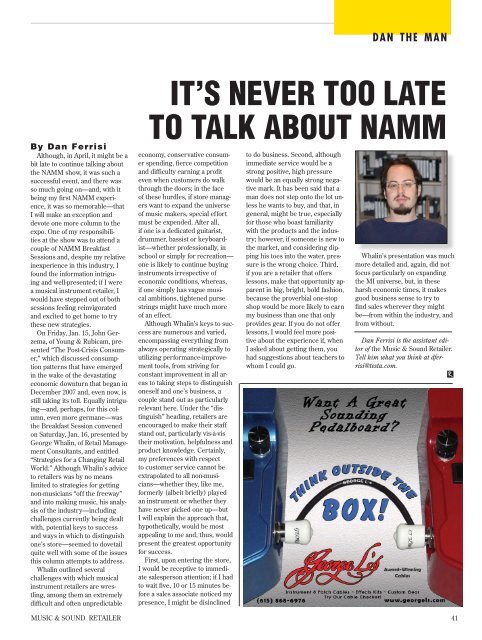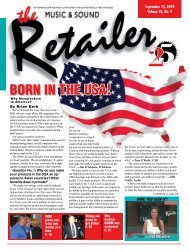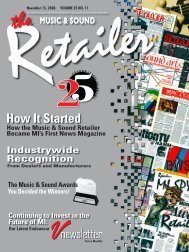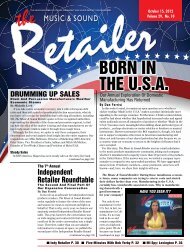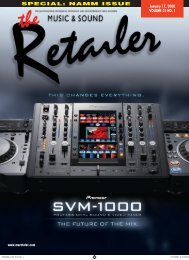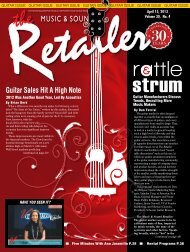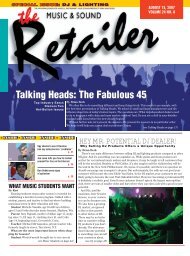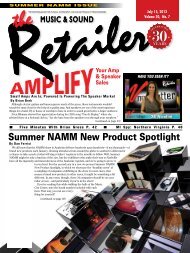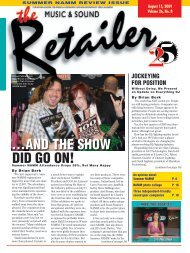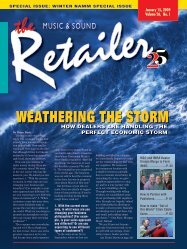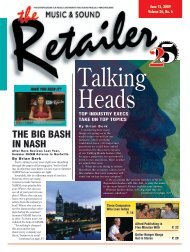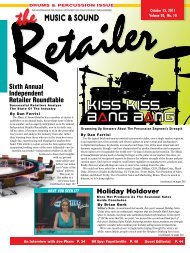laTeST - Music & Sound Retailer
laTeST - Music & Sound Retailer
laTeST - Music & Sound Retailer
You also want an ePaper? Increase the reach of your titles
YUMPU automatically turns print PDFs into web optimized ePapers that Google loves.
Dan THe MAn<br />
By Dan Ferrisi<br />
Although, in April, it might be a<br />
bit late to continue talking about<br />
the NAMM show, it was such a<br />
successful event, and there was<br />
so much going on—and, with it<br />
being my first NAMM experience,<br />
it was so memorable—that<br />
I will make an exception and<br />
devote one more column to the<br />
expo. One of my responsibilities<br />
at the show was to attend a<br />
couple of NAMM Breakfast<br />
Sessions and, despite my relative<br />
inexperience in this industry, I<br />
found the information intriguing<br />
and well-presented; if I were<br />
a musical instrument retailer, I<br />
would have stepped out of both<br />
sessions feeling reinvigorated<br />
and excited to get home to try<br />
these new strategies.<br />
On Friday, Jan. 15, John Gerzema,<br />
of Young & Rubicam, presented<br />
“The Post-Crisis Consumer,”<br />
which discussed consumption<br />
patterns that have emerged<br />
in the wake of the devastating<br />
economic downturn that began in<br />
December 2007 and, even now, is<br />
still taking its toll. Equally intriguing—and,<br />
perhaps, for this column,<br />
even more germane—was<br />
the Breakfast Session convened<br />
on Saturday, Jan. 16, presented by<br />
George Whalin, of Retail Management<br />
Consultants, and entitled<br />
“Strategies for a Changing Retail<br />
World.” Although Whalin’s advice<br />
to retailers was by no means<br />
limited to strategies for getting<br />
non-musicians “off the freeway”<br />
and into making music, his analysis<br />
of the industry—including<br />
challenges currently being dealt<br />
with, potential keys to success<br />
and ways in which to distinguish<br />
one’s store—seemed to dovetail<br />
quite well with some of the issues<br />
this column attempts to address.<br />
Whalin outlined several<br />
challenges with which musical<br />
instrument retailers are wrestling,<br />
among them an extremely<br />
difficult and often unpredictable<br />
It’s Never Too Late<br />
to Talk About NAMM<br />
economy, conservative consumer<br />
spending, fierce competition<br />
and difficulty earning a profit<br />
even when customers do walk<br />
through the doors; in the face<br />
of these hurdles, if store managers<br />
want to expand the universe<br />
of music makers, special effort<br />
must be expended. After all,<br />
if one is a dedicated guitarist,<br />
drummer, bassist or keyboardist—whether<br />
professionally, in<br />
school or simply for recreation—<br />
one is likely to continue buying<br />
instruments irrespective of<br />
economic conditions, whereas,<br />
if one simply has vague musical<br />
ambitions, tightened purse<br />
strings might have much more<br />
of an effect.<br />
Although Whalin’s keys to success<br />
are numerous and varied,<br />
encompassing everything from<br />
always operating strategically to<br />
utilizing performance-improvement<br />
tools, from striving for<br />
constant improvement in all areas<br />
to taking steps to distinguish<br />
oneself and one’s business, a<br />
couple stand out as particularly<br />
relevant here. Under the “distinguish”<br />
heading, retailers are<br />
encouraged to make their staff<br />
stand out, particularly vis-à-vis<br />
their motivation, helpfulness and<br />
product knowledge. Certainly,<br />
my preferences with respect<br />
to customer service cannot be<br />
extrapolated to all non-musicians—whether<br />
they, like me,<br />
formerly (albeit briefly) played<br />
an instrument or whether they<br />
have never picked one up—but<br />
I will explain the approach that,<br />
hypothetically, would be most<br />
appealing to me and, thus, would<br />
present the greatest opportunity<br />
for success.<br />
First, upon entering the store,<br />
I would be receptive to immediate<br />
salesperson attention; if I had<br />
to wait five, 10 or 15 minutes before<br />
a sales associate noticed my<br />
presence, I might be disinclined<br />
to do business. Second, although<br />
immediate service would be a<br />
strong positive, high pressure<br />
would be an equally strong negative<br />
mark. It has been said that a<br />
man does not step onto the lot unless<br />
he wants to buy, and that, in<br />
general, might be true, especially<br />
for those who boast familiarity<br />
with the products and the industry;<br />
however, if someone is new to<br />
the market, and considering dipping<br />
his toes into the water, pressure<br />
is the wrong choice. Third,<br />
if you are a retailer that offers<br />
lessons, make that opportunity apparent<br />
in big, bright, bold fashion,<br />
because the proverbial one-stop<br />
shop would be more likely to earn<br />
my business than one that only<br />
provides gear. If you do not offer<br />
lessons, I would feel more positive<br />
about the experience if, when<br />
I asked about getting them, you<br />
had suggestions about teachers to<br />
whom I could go.<br />
Whalin’s presentation was much<br />
more detailed and, again, did not<br />
focus particularly on expanding<br />
the MI universe, but, in these<br />
harsh economic times, it makes<br />
good business sense to try to<br />
find sales wherever they might<br />
be—from within the industry, and<br />
from without.<br />
Dan Ferrisi is the assistant editor<br />
of the <strong>Music</strong> & <strong>Sound</strong> <strong>Retailer</strong>.<br />
Tell him what you think at dferrisi@testa.com.<br />
<strong>Music</strong> & <strong>Sound</strong> <strong>Retailer</strong> 41


